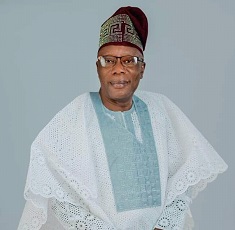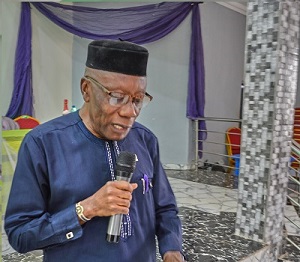(BEING LECTURE DELIVERED AT THE 2022 ANNUAL PUBLIC LECTURE AND ROLL OF HONOURS OF THE DEMOCRAT NEWS MAGAZINE AT THE NUP EVENT CENTRE, AKURE ON 5TH JUNE, 2022)
By
Mr. Steve Ayoola Bello, FWAPCEH
(Retired Director of Environmental Services)
&
Member, Board of Directors
Millennium College of Health Technology, Akure, Ondo State
INTRODUCTION:
Community leadership is not a tightly defined concept but is also defined by the boundaries of the community within which it operates. In their various shades, forms, realms and characters, community leaders are an essential part of the society and have been playing indispensable roles at the grassroots level in the development of the community. Traditionally, community groups, voluntary organizations, charities, etc all produce services that have culminated in community development. Grassroots innovations are usually driven by social and sustainable motives and developed by social society groups. Experience has shown that community leadership can aid the development of grassroots innovations, which operate in niches and require nurturing.
It is generally accepted that self-sustained grassroots community development is vital to the economic and social progress of any developing nation like Nigeria. Unless the ways and means of massively accelerating development in the rural areas where over 80% of Nigeria’s population reside (Guardian Newspapers, 2008); our national goal of self-sufficiency and control over resources may continue to elude us.
Without mincing words, the time to look back and energize this aspect of our traditional value and virtue that is already failing, falling and rapidly collapsing in contemporary Nigeria is no other time than now
I therefore, heartedly commend the Management of DEMOCRAT MAGAZINE for coming up with this apt and contemporary topical issue especially at a time like this in our historical evolvement when the development of Nigeria is crying for utmost attention and cannot be left in the hand of Government alone.
This paper conceptualizes what constitutes community development and how leadership can be strategically and sustainably repositioned to foster grassroots community development in Nigeria. It is based on the findings of in-depth, qualitative case study and research using literature of relevant academic, policy and grey literature.
WHO IS A COMMUNITY LEADER?
Community leader is a designation, often by secondary sources, for a person widely perceived to represent a community. A simple way to understand community leadership is to see it as leadership in, for and by the community. Community is frequently based in place and so is local, although it can also represent a community of common interest, purpose or practice. Community leaders are not necessarily elected to their positions, and usually, some have no legal powers but they are often used by the society in determining the general feelings within a particular community, or acting as a liaison between that community and authorities.

Community leaders are expected to be visible, active and responsive to community needs. This is most effective when they share in the local community: its goals, values and vision. A leader should be capable of making the whole greater than its parts; i. e. members of the community are assisted to act in a manner other than they could have on their own. In this way also, the leader provides a legacy as the investment has been made in encouraging people’s potentials. If a leader has the good sense to encourage, value and utilize the varied expertise in the group, then “community leadership” remains even when the initiating leader has departed. Mentoring and delegation are essential components of this process. The leader guides the process of sustainable development by empowering others and giving decision-making to the community.
Community leadership together with knowledge and skills, volunteering, networks and partnerships have been identified as among the five key indicators for stronger communities and civil society. Effective community leadership is not just an African idea as it is increasingly being recognized even in Western and Asian countries now. It is an important contributor to local social development. The leadership approach is based on a premise that individual development enhances community capacity. It must be recognized that community leadership is not a science. There is no one set of practice that ensures effective leadership. Community leadership needs to be and will continue to be redefined to suit different situations. It is certainly not a static concept.
HOW A COMMUNITY LEADER EMERGES:
In most rural communities, local leaders are normally democratically elected to represent the different sects in the community. This provides for the elected leaders to make genuine decisions that will favour majority of the people. Some are also naturally born to be leaders but still have to learn the skills of leadership.
People can learn how to lead even when not born to lead. This can be accomplished by watching and studying their parents, teachers or any other leader that they come across. They can learn from experience or taking classes in “leadership development”. In short, one can become a leader by jumping in and practicing, observing others lead, finding a mentor and even reading books about leaders and leadership.
However, the issue of gender is a major one. It is common knowledge that in many parts of Nigeria, women are not given equal opportunity for participation in community leadership like their male counterparts. Factors like cultural barriers, lack of respect for women, domestic engagements and entrenched gender stereotypes are responsible for women’s low participation in community leaderships. Regrettably, women in many occasions are socially, culturally and politically barred from participating in community development planning and decision-making process.
Ironically, it has been found out that the contribution of women in community development issues is very high and significant. One strong reason in their favour is that in most communities, women constitute the greater majority in terms of population. Women’s voices and concerns are especially important to community development. Moreover, some foreign development agencies such as the Gender and Diversity Programmes of the Consultative Group on International Agricultural Research (CGIAR) and the Commission on Advancement of Women – An American Council for Voluntary International Action are examples of women interventional agencies that target women and children programmes for funding and assistance. Women’s involvement in community development is therefore, inevitably indispensably in Nigeria.

QUALITIES/CHARACTERISTICS OF EFFECTIVE LEADERSHIP
Effective leadership involves commitment. Commitment is ineffective unless it is combined with specific objectives or a more general vision. Such objectives or vision should be community-centred not self-centred. It is possible to control through other emotions such as coercion or fear, but these techniques are only effective in unusual circumstances and are antipathetic to effective community leadership. Shared vision, balanced with pragmatic objectives and combined with inclusive practices, generates and maintains essential commitment.
Trust is further major indicator of effective leadership. Such trust has a number of sources, some of which relate to practices already discussed. It may, perhaps, come from the personal integrity of a leader, from his/her hard work or from previous engagement with the community. Trust may develop when leaders through their attitudes, approaches and actions indicate that they recognize that responsibility is owed to people as well as output/task/production.
Community leaders take responsibility for the well-being and improvement of their communities. Other qualities of a good community leader include:
Integrity – ability of being honest and having strong moral principles
Vision, collaborative planning and partnership
Courage – must be brave and possess strength in the face of pain/grief
Care about others – ability to be compassionate and affectionate
Creativity and flexibility – must be inventive and willing to change
WHAT ARE THE ROLES OF COMMUNITY LEADERS AT THE GRASSROOTS FOR DEVELOPMENT?
Since resources already exist in communities, what we need is the mastery of the practical wisdom and technology to mobilize them for our overall benefit. This is where leadership comes in. The main argument in favour of grassroots development is that communities are deemed to have a better knowledge of the prevailing local conditions (such as who is poor and deserves to be helped, or the characteristics of the local micro-environment), and a better ability to enforce rules, monitor behaviour and verify actions related to interventions.
Largely, community leaders make decisions on different issues affecting the community that require integrated approach, act as liaison between Government and non-Governmental agencies and the community for financial and technical assistance and raising funds through levies, donations, launchings, etc, to finance community projects in the area. They equally monitor and evaluate the projects for proper implementation.
Community leaders are always vocal, intelligent, cosmopolitan, knowledgeable, and sometimes educated. They play key roles in deploring their influence to attract those in the corridors of power to their communities for assistance. They, as change agents guide development occurring in their communities by making pro-active planning decisions versus reactionary planning decisions.
COMMUNITY DEVELOPMENT
Community development, according to Professor Ade Ajayi (1995) is a process by which human beings can become more competent to live with and gain some control over local conditions and the changing world. It is the process of improving the quality of life and economic well-being of people living in relatively isolated and sparsely populated areas. It is integrated approach to the provision of physical, social and institutional infrastructure with an ultimate goal of bringing about both quantitative and qualitative changes which result in improved living standard of the community to enable them contribute fully to national progress.
Community development can also be defined as a movement designed to promote better living with the active participation and if possible on the initiative of the community but if this initiative is not forthcoming spontaneously by the use of techniques for arousing and stimulating it in order to ensure its active and enthusiastic response to the movement. Community development is a holistic approach grounded in principles of empowerment, human rights, inclusion, social justice self-determination and collective action.
Succinctly put, community development is a set of values and practices which plays a special role in overcoming poverty and disadvantage, knitting society together at the grassroots and deepening democracy. On the other hand, sustainable community development according to World Commission on Environment and Development Brundkland Report (1987) is the development that meets the needs of the present without compromising the ability of the future generations to meet their own needs. Sustainable community development cannot take place through force or order, but is most likely to happen when all actors participate and share their ideas, visions and responsibilities equally and democratically in steering and implementing their community development projects.
EXISTING STATE OF COMMUNITY DEVELOPMENT IN NIGERIA
Communities in Nigeria are bedeviled by many problems which hinder sustainable community development. These problems include poverty, crime, illiteracy, women disempowerment, depletion of the environment, land disputes, conflicts, ethno-religious conflicts, youth restiveness, etc. Many lack the basic necessities that will lift them off the quagmire of poverty such as self-esteem, shelter, freedom from servitude and health. Many are still homeless as well as unable to obtain good health care.
In Nigeria, it is estimated that there are over 25 million farm families who are supposed to be reached by extension workers. Currently, the extension worker/farm family ratio is 1:250. This means that 100,000 extension workers have to work in the rural communities. Unfortunately, Nigeria cannot boast of one tenth of this number presently. This dearth of extension workers indicate that many rural dwellers are not reached and therefore, not exposed to and cannot access new innovations and technologies in agriculture, amenities, etc.
Since government cannot afford to employ the number of extension workers needed, the logical solution will be to utilize the services of community leaders to compliment and accomplish the community development tasks. It therefore, falls on the communities to free themselves from the shackles of underdevelopment with or without government support and embrace sustainable community leadership that will enhance grassroots community development.
HOW TO PROPERLY POSITION COMMUNITY LEADERS IN ENHANCING GRASSROOTS DEVELOPMENT IN NIGERIA:
Having discussed who community leaders are, their qualities, roles and how they are endowed and strategically positioned as initiators and catalyst of grassroots development, it is expedient, at this juncture, to look at how to properly reposition them for sustainable community development which is what this paper is attempting to address.
Four major values to promote sustainable community development through proper positioning of community leaders are critical. They are emergence mode of the leader, character, motivational enabling environment and proper funding.
EMERGENCE OF THE LEADER: How leaders emerge or are chosen is crucial to their acceptance and performance in the community. Undoubtedly, the way these leaders get into leadership positions in their communities is very germane to the performance of these leaders in their various communities.
In most rural communities, local leaders are normally democratically elected to represent the different sects in the community. This makes their integrity to be at stake in decision-making that will favour the people. It is therefore, imperative that the set rules and guidelines for choosing electable leaders in the communities must be acceptable and followed. In the case of natural, voluntary, non-hierarchical and non-electable leaders, the qualities and characters must be ensured to be possessed by the would-be leaders.
CHARACTER: Another essential ingredient in repositioning community leaders is for the leader to possess the qualities required. The fundamental problem in a democratic organization is that of finding, developing and retaining a functioning leader at all levels.
The early part of this lecture dealt much on these characters but they are not limited to those ones. Since the leader plays a pivotal role in community development, the parameters for the emergence of a leader are almost endless as bad leadership is tantamount to attempting driving a car without an engine. As the person to guide his people, he too must be guided by the understanding that community development has the principal purpose of bringing about desirable changes for better living among people.

Other parameters in identifying good leaders include acceptance of the group, spirit and desire to lead, ability to make sacrifices, detribalization, humility, accountability, modesty, etc. He must endeavour to lead his people to identify the problem inhibiting their progress as a community and should lead them to be prepared to solve them using the resources of the community and manage external resources coming to the community. He must be ready to accept constructive criticism which lead to improvement in his leadership and also ensure that as the head in his relay race, he has to hand over the baton of leadership to a successor who will continue his achievements sustainably with fear of God. He can always look in retrospect satisfied that nothing will bother his conscience.
MOTIVATION: Having established the mode of emergence and the characters the leader must possess to ensure sustainable community development, in the same vein, development can only be sustained over the long-term if these leaders are motivated and committed to keeping the momentum going. Despite the fact that many of the rural development projects initiated and executed by government and NGOs are failing in Nigeria, there still abound many self-help projects in most rural communities that are well executed, properly maintained and sustained. This is because in these communities, there are structures occupied by motivated community leaders who are the drivers of these projects. These community leaders still value the norms and customs of their communities.
Training and retraining of community leaders is another motivational way that must be emplaced for grassroots community development to be impactful. When community leaders initiate projects, what skill and knowledge practices do they utilize to nurture them? Regular workshops and seminars are needed to supply information, broaden their knowledge and widen their scope on new technological and social innovations in order to properly reposition them for the arduous task of grassroots community development.
Motivation goes a long way in boosting the morale of the community leaders and it can never be over-emphasized. Another approach to achieve this is to give them constitutional recognition and roles. This will embolden and empower them in performing their roles more effectively.
FUNDING: In the early part of this lecture, the issue of funding came up. It has been identified that one of the roles of community leaders is to raise funds for community development through launchings, donations, levies, etc,. Major communities are not too buoyant enough to raise adequate funds needed for projects. It has become expedient for individual philanthropists, public enterprises, non-governmental organizations and even governments at local, state and federal levels to donate their widow’s mite monetarily, materially, technologically and even morally (advice) towards community development projects.
However, the issue of accountability must come to play here. Raising funds for projects in rural communities is a very sensitive task because most times, the funds are not properly utilized due to corruption and lack of transparency. This has often generated crisis in most communities where some interest groups that are not satisfied with the way previous projects were executed may boycott participating in future launchings or paying levies. The way out is for community leaders not to involve themselves with community finances but where it becomes inevitable, they must ensure openness, probity and accountability.
CONCLUSION
In concluding this lecture, it is not in doubt that leadership, when properly positioned plays a critical role in promoting grassroots community development in Nigeria. This paper has modestly taken consideration of the role of effective community leader in promotion of sustainable community development in the Nigerian context using community energy as empirical evidence. Poverty has bedeviled many communities resulting to under-development in the country.
Sustainable development therefore, will mean that the leadership should be repositioned, take the bull by the horn and tackle many of the teething problems which have engendered our communities. Once he is trusted by the community members, he would be able to lead them successfully to sustainable community development.

As a matter of fact and urgency, Nigeria should take a critical reappraisal of the quality of leaders and properly reposition them to ensure that the regressive, unsustainable conditions prevailing in the entire country will be reversed.
At this juncture, let me reiterate that grassroots development is synonym with local development. For grassroots development to thrive, the Nigerian Government should take a cursory at into our Local Government system which is the closest to the grassroots where the community leaders are based and operate.
I therefore, use this forum to add my little voice for more recognition of the Local Government system as the third tier of Government in Nigeria. It is only logical to say that if grassroots community development is indeed, an indispensable essential ingredient which is capable of triggering the macro-development of our country, the Local Governments must be constitutionally empowered and adequately funded.
Finally, once again, I wish to reiterate that I do not take the invitation by Democrat News Magazine to deliver this lecture for granted. It has been an opportunity for me to ventilate the little I know on a topical national issue. If it is found worthwhile, I give honour, glory and adoration unto God who gives all things. In no small measure too, I value my amiable brother and friend who made the invitation possible. Once again, I immensely appreciate the organizers for counting me worthy to deliver the lecture. Last but definitely not least, I thank the distinguished guests for listening admirably with rapt attention.
Thank you and God bless you bountifully.
